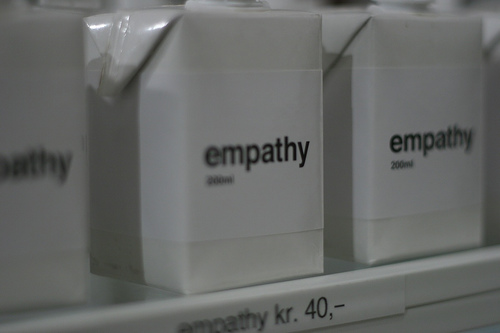One of the most important Christ-like attributes (in my book) is empathy. Maybe you’re thinking, “wait, that’s not in the Preach My Gospel attribute chapter.” But really. Have you read Alma 7:12 lately? Here’s a review.
Alma 7:12 … and he will take upon him their infirmities, that his bowels may be filled with mercy, according to the flesh, that he may know according to the flesh how to succor his people according to their infirmities.
His empathy allowed Him to see other people’s perspective and be filled with mercy.
So when people struggle with certain changes (i.e. new changes to apostasy definition) is it fair, or even Christ-like, to shut down the conversation deeming their feelings unimportant with “that’s just the way it is” or “the Brethren know what they are doing.” It is not a battle of who is right. It is an opportunity to show that we dare to mourn with those that mourn. And if you can’t mourn, well, maybe you can at least listen.
Just to be transparent, I’m totally supportive of gay marriage. I’m actually happy for my gay friends that didn’t grow up LDS because there is never a question of whether they are allowed in the home or if the parents will go to the wedding. It is all unconditional love. Crazy idea, right? But I’m not here to sway readers to believe what I believe, just to express another viewpoint to consider.
When it comes to the new policies for charging members in gay marriages with apostasy, sad barely describes the depth of my emotion. I’m not gay, but I try to understand their perspective. If you’ve always fit the Mormon ideals, then it’s hard to understand how being different can make you feel broken. Gay members having to choose between a life of being alone in order to fully participate in church, or to choose a committed relationship and give up their membership is not a position I envy.
In a small way, it feels like my choice of staying with a husband who left the church or giving up my marriage for the sake of having traditional church life. It was never an easy decision. When the church and its culture are part of your core identity and you realize you will never be able to have all aspects of church while being married, it hurts. Horribly. On the other hand, if I left my husband it meant I was also going against my core beliefs of family and love. I chose my marriage and I do not regret it!
(Side note: Recently, several people have asked my parents if they’d rather I had moved on to a “righteous priesthood holder” instead of staying with my husband and becoming less involved with the church. Luckily my awesome mom responded that if I left my husband, she would leave me. Way to go Mom!)
Which leads me to the next part of the manual update- what about the kids who can’t be blessed or baptized because they have gay parents? Are they broken too? If they are old enough to be accountable, then shouldn’t we let them? The implication is that 8 year olds are not actually accountable enough to make such a decision without “traditional” parents there to help them. Maybe everyone should have to wait until 18 to make such covenants.
Look at it from the social perspective, too. Facebook is plastered with pictures of little eight-year olds dressed in white with their daddy next to them. Or the latest rage is to have a huge reception-sized baptism cake and party with a display of professional photographs of the child holding their new set of engraved scriptures. Now try to empathize with the pain of the child who doesn’t get any of this– not because of the family budget, but because the church policy explicitly forbids them from getting baptized. I can’t help but find the parallels between this policy and policies the church has had in the past regarding race. What once was deemed doctrine that certain races were inferior and that mixed marriages were sinful has been renounced by the church.
“Today, the Church disavows the theories advanced in the past that black skin is a sign of divine disfavor or curse, or that it reflects unrighteous actions in a premortal life; that mixed-race marriages are a sin; or that blacks or people of any other race or ethnicity are inferior in any way to anyone else. Church leaders today unequivocally condemn all racism, past and present, in any form.” (https://www.lds.org/topics/race-and-the-priesthood?lang=eng)
Clearly policies change and even doctrine can change as we, including leaders, gain understanding and try to move past our own biases. There is no point to being unkind to each other during this process.
Again, it’s not a matter of agreeing or disagreeing. It is about trying to understand how others may feel who are impacted by this policy. It’s about empathy. I know many disagree with me about gay marriage, but maybe we can all agree on and empathize with the difficulty of the decisions gay members face.
~ RL is an anonymous writer for the Cultural Hall. For most of her life, she rocked at being a perfect Mormon including graduating from BYU, serving a mission, getting married in the temple, and multiplying and replenishing the earth. Then one day her husband shared his doubts about the church and all she “worked for” seemingly disappeared. That’s when she decided to share her journey with the Cultural Hall. For her, it’s all about simplifying (thanks for the talk Elder Uchtdorf) and prioritizing. She represents the back rowers and the no goers. Though her approach to Mormonism has changed, she still loves being part of the Hall. Her current calling is a self-appointed one- writing pieces for the Cultural Hall that make cafeteria and cultural Mormons feel welcome. She also likes cats.

